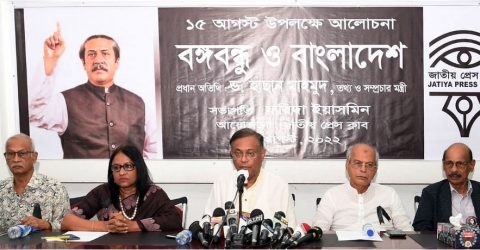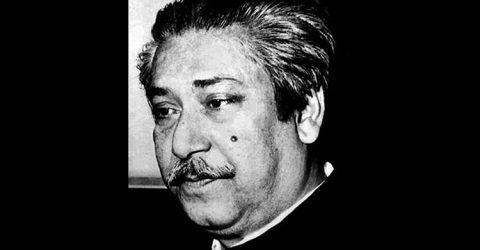
Several people having no links to the August 15, 1975 carnage witnessed the carnage scene at 32 Dhanmondi after the assailants carried out the massacre exposing the nation to a state of hollowness while these people continued to bear their horrific memories.
Liberation War veteran major general (retd) Jibon Kanai Das, who was a captain at that time, was one of those to visit the scene and came out with his memories of the day coinciding with Father of the Nation Bangabandhu Sheikh Mujibur Rahman’s 47th martyrdom anniversary.
“I was a captain then serving as Officer Commanding, Bulk Inspection Unit (now Bulk Inspection Section),” Das said, adding on that fateful day he was staying at 2nd E Bengal officers mess at the Dhaka Cantonment’s Bijoy Keton area with his friend, recently expired, Captain M Muqtadir Ali, who came to Dhaka from Rajshahi to face an interview.
The former general said they both came to know the unbelievable news as Muqtadir, after getting up from bed, was habitually fiddling with the transistor radio kept in the room and “this early morning shock and trauma totally overwhelmed us”.
Das said the news prompted them to quickly move to his BSD office while there were “confusion, apprehension, shock and expressionless faces” all around.
“At around 9 a.m., we could see a machinegun mounted open jeep carrying coup leaders Major Dalim and Lieutenant Colonel Syed Faruqur Rahman entering the Army Headquarters,” he said adding the two assailants went back towards the city area half an hour later.
Meanwhile, Das said he was asked by a senior colleague at BSD Major M Bazlul Karim to accompany him to get a military supplier’s truck released as it was stuck in Lalbagh area since the usurpers declared martial law through the radio broadcast.
“I did not know what to and not to do. I joined him and so did my friend Muqtadir,” he said and recollected that streets were “absolutely barren and the people were anxious as much as confused”.
Having done the task of resolving the issue of the onion-loaded truck, Karim took Mirpur road to return and in the cross-section at the eastern end of Road 32, he stopped and spotted Major Bazhil Huda, one of the coup leaders.
“It was about 11 am. In the course of discussion with Major Karim, Major Bazhil Huda was narrating their story and at some point invited him, by extension all of us in the group, to have a look inside if we desired so,” Das said.
Das said captain Muqtadir and he had absolutely no intention to respond as refusal to do so might invite the killers’ wrath and so “we just followed the others”.
Following is the rest of Das’s verbatim testimony about what he saw:
“What we witnessed was absolute horror and much worse than what we feared. Getting into the yard west of the building, we saw a car parked there. We were told Colonel Jamil Ahmed, military secretary to the president, responded to a distress call from Bangabandhu. He couldn’t perhaps figure out the scale and dimension of unfolding event. Ignited by the burning soldierly instinct of responding to the senior’s, he pressed on, began arguing with the perpetrators who were guarding the axis. They then shot and killed him instantaneously, pushed the car into the compound with the dead body in it.
“We then moved inside the house from the western door to the reception room located south-west. Here we found the dead bodies of Captain Sheikh Kamal (Retd) and the police officer on duty. Everything was scattered, smashed which indicated a huge volume of fire had been brought to silence the two. On way back, the bathroom door was opened to let us see the dead body of Sheikh Abu Naser. It was almost floating on blood indicating cold-blooded murder using bullets as well as bayonet.”
“As we began to move through the stairs to the floor, we could witness blood flowing down along the inner side of the stairs. One could easily sense what would be the source – the fallen body of our great leader -Bangabandhu. He wore, as always, white panjabi and lungi. Spectacles got broken, yet, it was kept on top of his unusually swollen stomach along with pipe and Erinmore tobacco can. The butchers left nothing to chances as they pumped innumerable bullets to gun him down.
“Up on the floor, we saw two NEC television sets which had four legs – one old (in use) and other absolutely brand new – perhaps a gift to one of the newly married sons. The shelves behind those were to contain gold ornaments. By then, what was left here clearly indicated much more were removed as they mostly wore blank look. The master bedroom in the north-west was left untouched except that the bed contained all the tobacco pipes of Bangabandhu duly scattered. The body of Lieutenant Sheikh Jamal with eyes open and as if nothing had happened to him, was lying in the northern end of the family living space whereas those of Sheikh Russel and Begum Mujib were lying towards the southern side close to each other as if the mother was still nursing the young lad.
“The bodies of the newly married daughters-in-law were lying in the east room. Major Bazlul Huda continued with his narration of the horror stories. These family members were killed mercilessly after Bangabandhu was gunned down. But nothing really went into our head except realising what a great tragedy that had befallen. We were horrified, totally shocked and dumbfounded.
“In the meanwhile, we could observe flies, insects and mosquitoes were making their rounds all over the dead bodies. Captain Muqtadir and I felt, come what may, these dead bodies now needed to be treated properly. Over six hours had passed, there were perhaps a good number of visitors who went by. Yet these bodies were left as they were. We also began to gauge what could be the reactions on Major Huda and members of his group. Right from the days of the War of Liberation 1971, we were trained and taught to show proper respect to the dead bodies irrespective of the side they belonged to. The Pakistan occupying army and their collaborators never ever paid any such respect to any Bengali they killed and they killed millions. In sharp contrast we were totally committed to Geneva Protocols. We therefore, concluded that we should follow the best tradition of our beloved Bangladesh army. Lieutenant Sheikh Jamal was our comrade-in-arms. As a test case, we decided to cover his dead body first and judge the reaction of the killers.
“Earlier, we spotted clean and tidy bed sheets were kept stacked in the racks of the master bed-room. We brought out one and with a very heavy heart covered the body. Needless to say, hardly have we exchanged any words between the two of us to do what we did. Notably, we did not find any worthwhile unusual reactions in the killers who appeared unrepentant all the while.
“In continuation of what we did, faithfully we covered the dead bodies of Sheikh Russel, his mother and two sisters-in-law one after another. More than anything, we wanted momentary removal of the brutalities from our mind by doing what we did for we could not bear it at all. Now the big question facing us was what to do with the dead body of Bangabandhu. Undaunted by any thought of potential consequences, we decided to go ahead with our works. With all love, respect and humility that we could marshal, we neatly placed another bed sheet to cover the body- of our fallen leader, stood in silence for a while. And we ventured no further.
“Just when he was putting the wheel of progress of this nation on its rail, these assassins struck. Simultaneously, they gunned down some other family members of Bangabandhu elsewhere seemingly to eliminate the larger Sheikh family. It was brutal, merciless and vengeful to say the least.
“To someone what we did might appear to be not a very big deal. Indeed it was not; but something needed to be done and we did just that. Both of us felt this could be our last respects to the leader and the rest of the family members. This scenario continues to haunt us even today – 46 years later, perhaps till we pass away. Sadly, my friend Major M Muqtadir Ali passed away on August 20, 2021. None of us, if ever, made any attempt to share our traumatic experiences with anyone. It had been an unparalleled national tragedy and the grateful nation particularly the new generation, we felt, needed to know of it.”




